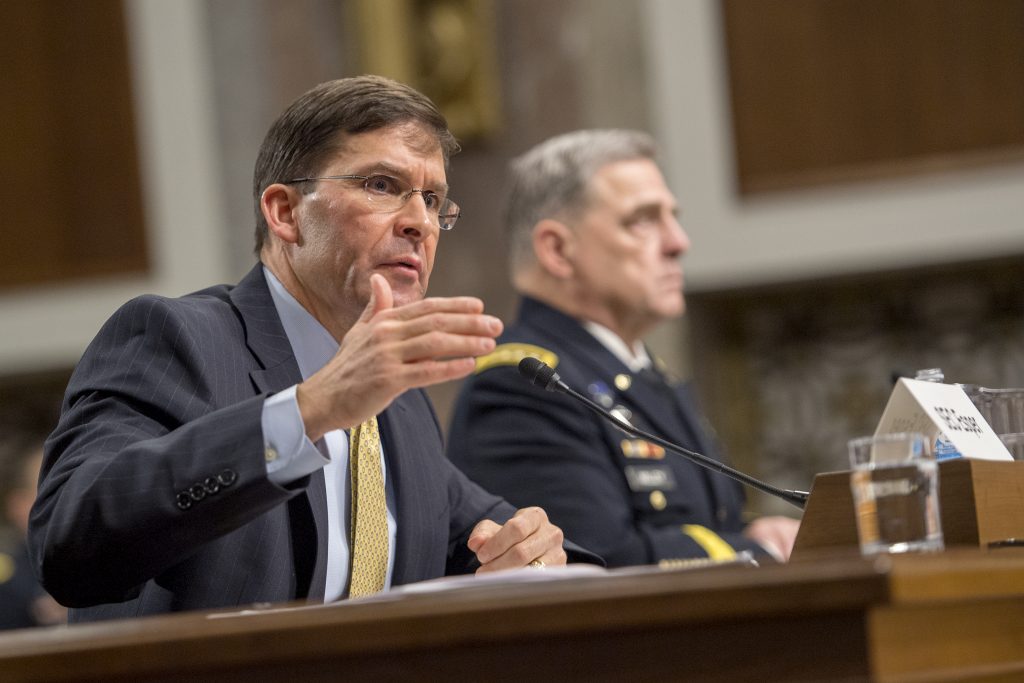Top Army Buyer Warns Industry To Guard Its IP Until New Policy
Posted on
ARMY S&T CONFERENCE: Until the Army finalizes its new policy on intellectual property — probably in “a couple of months” — the service’s acquisition chief is warning contractors to tread cautiously when discussing details of their IP with the government.
Bruce Jette, assistant secretary of the Army for acquisition, logistics & technology (ASAALT), says he, his subordinate Program Executive Officers and Program Managers, and other Army leaders are trying to have an open-door, y’all-come-on-in approach to innovative ideas from industry. But the thin skein of protections for companies’ intellectual property has been an impediment. Companies need to take some precautions, said Jette, a former DoD contractor himself, “until we get some more stringent rules in place.”
“Does that mean you can’t talk to us? No,” Jette told the National Defense Industrial Association conference here on Army science and technology. “What it means is, if you have secret sauce, reserve the secret sauce. Make sure we understand what you want to talk about. Only when we get down to contract discussions should you bring out the secret sauce.”
“Why am I telling you this?” he said. “Just recognizing we’ve got an area that is a challenge is important.”
It was an unusually candid admission from a top Defense Department official that industry has long-standing and often justified concerns that government will reveal or even copy their proprietary technology without due payment. It was also a promise the Army is going to make things better.

Army Secretary Mark Esper checks out a helicopter cockpit during a visit to Fort Knox, Ky. Upgrading military electronics is complicated by negotiations with companies over using proprietary technologies.
Protecting Intellectual Property
“We’ve got an extensive intellectual property policy that’s being written,” Jette told the NDIA conference here. When will it go into effect? “My guess is probably the next couple of months,” he said, but given the wide potential impacts, the draft policy first has to go through “a bajillion reviews (with) lots of lawyers” at the Office of the Secretary of Defense and elsewhere.
“It’s being scrubbed,” Jette said. “It’s got to be scrubbed against all the laws, it’s got to be scrubbed against the FAR. It’s got to be scrubbed against DFAR. It’s got to be scrubbed against the (existing) policies, and we’re working our way through that.”
One goal is to make discussing IP with the government much more like discussing it with a potential private-sector customer. That way, Jette said, “(if) you want to exchange something that’s a bit more secret sauce, you can have a non-disclosure agreement that you can sign across the table, (clarifying) what is and what is not to be disclosed by the government” to any third parties.
Today, however, intellectual property is a chronic point of tension between the government and defense contractors. Private companies — especially small ones whose IP, such as software or a patent-pending innovation, is their only asset — are fearful that if they tell the government too many details, it’ll intentionally or inadvertently let slip trade secrets to their competitors or use it on its own. The government, for its part, fears what’s known as “vendor lock.” That’s when the government builds a whole system around a single contractor’s proprietary technology, and there’s no way any other company can compete because they can’t use that IP.
One way around this, Jette said, is to build systems in modules, all of which meet common standards on how to interface with each other. Contractors benefit because their proprietary technology doesn’t interact directly with the larger system, essentially acting a black box inside a module. The government benefits because you can plug-and-play new tech as needed, and any company’s technology will fit as long as the contractor builds the standard interface around it.
“We want interfaces that are exchangeable and modular so that we both stay honest with each other,” Jette said.
The term of art for this approach, though I didn’t hear Jette use it, is modular open architecture. As usual, there are plenty of devils in the details. It’s tricky to define a standard interface so everyone understands it the same way and produces modules that are truly interchangeable. But it’s the way commercial information technology is going, Jette said, and the Army needs to follow.
Dialogue Without Lawyers
Using open architectures and establishing a clear policy on intellectual property are both ways to achieve Jette’s greater goal: a more intimate, relaxed conversation between the Army and innovators in industry, where both sides can bounce ideas off each other and move faster.
“We used to produce these very large requirements documents, huge, and they prescribed to industry exactly what we needed” (or thought the Army needed), the Vice-Chief of the Army staff, Gen. James McConville, told the NDIA conference. “We can be quicker by working with industry and being a little less prescriptive…. providing them a problem statement” but not telling them how to solve it. “We’re getting innovation that way we might not have even thought about.”
To do this, McConville, Jette, and other Army leaders want industry to be able to pitch new technologies, but they also want to be able to tell industry what the Army needs and get feedback, in an informal context, on what’s possible. That way the Army can develop its formal requirements with constant feedback from industry, rather than in ivory tower isolation, and only ask for products that industry can actually build on schedule and on budget.
The complication is that federal laws and regulations restrict the government from meeting with any one company but not with another, lest it give one an unfair advantage. Even if the Army meets with all the competitors, if it meets each one-on-one, someone could argue their meeting was with a lower ranking official, shorter, or less informative, and therefore grounds to protest a contract award to the Government Accountability Office. Even a denied protest can delay contract award by months.
“If you’re going to be involved in competition, you can either see no one or you can see everyone,” Gen. McConville said. “We have taken the approach, the senior leadership has taken the approach, that we pretty much see everyone at our levels.”
McConville didn’t name names, but when someone talks about “senior leadership” in the context of acquisition, that generally means McConville himself as Vice-Chief, Chief of Staff Mark Milley, Undersecretary Ryan McCarthy, and Secretary Mark Esper — the Army’s big four — and the senior acquisition executive, Jette.
“Most companies if they come in, they want to show us something, we will see them,” McConville said. “What we’re trying to do is open it up to everybody.”
As a practical matter, Jette said, getting on the schedule of a senior leader — or even a run-of-the-mill program manager — is very hard. Rather than expecting to meet with someone at once, it’s better to send a white paper so the Army can winnow down the proposals to the ones in which it’s genuinely interested. But once you get in the door, that dialogue should be very open indeed.
“I met with an industry leader yesterday,” Jette recounted, “and he said, I’m just amazed at this meeting… There’s no lawyer (in the room). That’s the type of openness I want us to have.”
To be this open, Jette said, the Army does not need Congress to change any laws. The barrier is more the military’s own risk-averse culture. “The biggest problem with dialogue with industry is the fear people have….If the law is here,” he said, standing right on the edge of the stage, “our lawyers tend to have us stand back here” — several giant steps back. (I’ve seen this at work first-hand, with an unexpected decree by Army lawyers hamstringing a high-level “innovation summit” in 2016).
But if the government takes full advantage of all the leeway the law actually allows, Jette said, industry needs to respect the very real limits that remain. His “mantra,” he told the conference, is “a conversation is not a contract: do not assume that somehow you got a sale because you had a conversation with someone and they thought your stuff is cool.”
What he didn’t say out loud: Above all else, just because we said nice things to you but ended up awarding the contract to someone else, please don’t protest to the GAO.
Subscribe to our newsletter
Promotions, new products and sales. Directly to your inbox.



